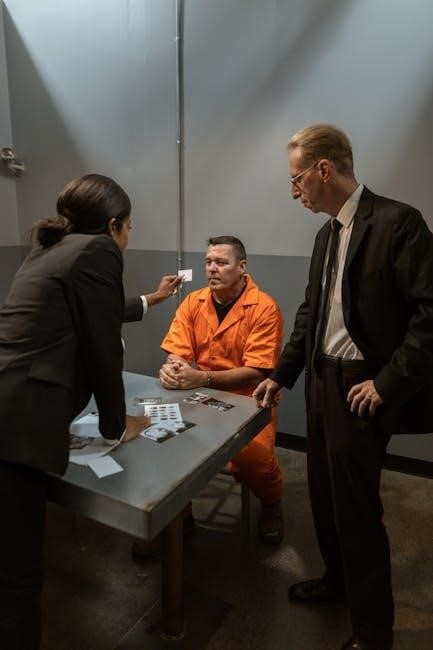Competency-based interviews assess specific skills and experiences to evaluate a candidate’s suitability for a role․ They focus on past behaviors and problem-solving abilities, ensuring candidates align with organizational values and responsibilities․
1․1 What Are Competency-Based Interviews?
Competency-based interviews are structured conversations designed to assess specific skills, behaviors, and experiences relevant to a job role; They focus on how candidates have handled situations in the past to predict future performance․ In policing, these interviews evaluate essential traits like decision-making, integrity, and communication․ Questions are tailored to uncover real-life examples that demonstrate a candidate’s ability to meet the demands of the role․ This method ensures that selections are fair, transparent, and aligned with the organization’s values; By focusing on measurable competencies, police forces can identify individuals who possess the necessary skills and ethical standards to serve effectively․
1․2 Importance of Competency-Based Interviews in Policing
Competency-based interviews are crucial in policing as they ensure candidates possess the necessary skills, attitudes, and ethical standards to perform effectively․ These interviews help assess traits like decision-making, integrity, and communication, which are vital for police officers․ By focusing on real-life examples, they evaluate how candidates handle challenging situations, ensuring they align with the force’s values․ This approach fosters transparency, fairness, and accountability in the selection process․ It also helps identify individuals who can uphold public trust, manage stress, and make sound judgments in high-pressure environments, ultimately contributing to a more capable and ethical police force․

Key Competencies Tested in Police Interviews
Police interviews assess critical competencies like communication, decision-making, integrity, teamwork, and adaptability․ These skills ensure candidates can handle diverse challenges effectively while maintaining ethical standards;
2․1 Communication Skills
Communication skills are vital for police officers, as they interact with diverse communities, colleagues, and situations․ Competency-based questions evaluate how candidates articulate thoughts clearly, listen actively, and adapt their communication style to different audiences․ For example, candidates may be asked to describe a situation where they had to explain complex information simply or de-escalate a tense interaction․ Demonstrating clarity, empathy, and the ability to convey information effectively is crucial․ Strong communication ensures effective collaboration and builds trust within the community, making it a cornerstone of policing․
2․2 Decision-Making and Problem-Solving
Decision-making and problem-solving are critical competencies for police officers, as they often face high-pressure situations requiring swift, ethical, and effective resolutions․ Competency-based questions in this area assess how candidates analyze problems, weigh options, and arrive at sound judgments․ For instance, candidates might be asked to describe a situation where they had to make a tough decision under pressure or resolve a complex conflict․ Demonstrating logical thinking, resourcefulness, and the ability to prioritize ethical considerations is essential․ These skills ensure officers can handle diverse challenges responsibly, upholding public safety and trust․ Effective problem-solving also enhances teamwork and operational efficiency․
2․3 Integrity and Ethical Behavior
Integrity and ethical behavior are paramount for police officers, as they uphold the law and serve as community role models․ Competency-based interviews include questions that probe a candidate’s moral compass, honesty, and commitment to ethical standards․ Candidates may be asked to discuss situations where they faced ethical dilemmas or observed misconduct․ Demonstrating transparency, accountability, and a strong moral framework is crucial․ Police forces seek individuals who consistently act with integrity, ensuring public trust and maintaining the highest professional standards․ These questions help identify candidates who align with the organization’s values and can navigate complex ethical challenges responsibly․ Ethical behavior fosters credibility and respect within the community․
2․4 Teamwork and Collaboration
Teamwork and collaboration are essential skills for police officers, who often work in teams to maintain public safety and resolve complex situations․ Competency-based interviews assess a candidate’s ability to cooperate, communicate, and contribute effectively within a group․ Questions may include scenarios where the candidate had to collaborate with others to achieve a common goal or resolve a conflict․ Demonstrating active listening, respect for diverse perspectives, and willingness to support teammates is vital․ Police forces prioritize candidates who can build strong relationships and work seamlessly with colleagues, ensuring cohesive and effective operations․ Collaboration fosters a positive work environment and enhances overall performance in law enforcement․
Adaptability and resilience are critical for police officers, who face unpredictable and high-pressure situations․ Competency-based interviews evaluate how candidates handle change, recover from setbacks, and maintain performance under stress․ Questions may ask for examples of adjusting to new procedures or bouncing back from challenges․ Demonstrating flexibility, emotional stability, and a growth mindset is crucial․ Police work demands officers who can adapt quickly to evolving scenarios while remaining composed․ Resilience ensures they can manage the emotional and physical demands of the job, providing consistent and effective service to the community․ These traits are vital for long-term success in law enforcement․ Competency-based interviews often include behavioral and scenario-based questions to assess skills like decision-making, problem-solving, and communication․ Candidates are typically asked for specific examples to demonstrate their abilities․
Behavioral questions in police interviews focus on how candidates have handled past situations, using these examples to predict future performance․ These questions often begin with prompts like “Tell me about a time when․․․” or “Describe a situation where․․․”․ They are designed to assess key competencies such as problem-solving, communication, and decision-making․ For example, candidates might be asked to recount instances where they demonstrated leadership, resolved conflicts, or worked under pressure․ Employers use these responses to evaluate how well a candidate’s past actions align with the skills and values required for the role․ Preparation is crucial, as candidates should provide specific, structured answers․ Scenario-based questions present hypothetical situations to assess how candidates would handle real-life challenges in policing․ These questions evaluate problem-solving, judgment, and decision-making skills․ For example, candidates might be asked, “What would you do if you encountered a hostile crowd while on patrol?” or “How would you respond to a situation where a colleague was acting unethically?” These questions require candidates to think critically and demonstrate their ability to apply ethical reasoning and practical solutions․ They are designed to mirror the complexities of policing, ensuring candidates can navigate high-pressure scenarios effectively․ Preparation involves understanding common policing dilemmas and practicing structured responses․ Questions assessing integrity and ethics are designed to evaluate a candidate’s moral judgment and commitment to upholding ethical standards․ These questions often focus on hypothetical or real-life scenarios where honesty, fairness, and accountability are tested․ For example, candidates might be asked, “What would you do if you witnessed a colleague acting unethically?” or “How would you handle a situation where a member of the public offered you a bribe?” These questions require candidates to demonstrate their ability to make sound, principled decisions, even in challenging situations․ Preparation involves understanding the ethical principles of policing and practicing responses that highlight honesty and moral courage․ Research the police force and role, review the job description, and practice with sample questions․ Use the STAR method to structure your answers effectively․ Researching the police force and role is crucial to understanding their values, mission, and specific responsibilities․ This helps align your skills and experiences with their expectations․ Start by reviewing the official website, annual reports, and community engagement initiatives to gain insights into their priorities․ Understanding the role’s demands, such as handling emergencies or community policing, allows you to tailor your answers․ Familiarize yourself with the organization’s structure and key challenges they face․ This preparation demonstrates your commitment and helps you articulate how your background matches their needs․ Use the STAR method to frame your experiences effectively, ensuring your responses are relevant and impactful․ Stay updated on current policing issues to show genuine interest and readiness․ Thoroughly reviewing the job description and person specification is essential to understanding the skills and qualities the police force seeks․ This step helps align your experiences with the required competencies․ Pay attention to keywords like communication skills, problem-solving, or integrity, as these are likely to be focal points in the interview․ Identify specific examples from your past that demonstrate these traits․ Understanding the role’s responsibilities and the desired personal attributes allows you to tailor your answers effectively․ This preparation ensures you can confidently showcase how your background and skills match the police force’s expectations, making your application more compelling and relevant․ Practicing with sample competency-based questions is crucial for preparing effectively for your police interview․ Researching and reviewing common questions helps you anticipate what may be asked․ Focus on questions related to communication skills, problem-solving, and integrity, as these are frequently emphasized․ Use online resources, such as “police competency-based interview questions and answers PDF,” to access realistic examples․ Practice articulating your thoughts clearly and concisely, ensuring your responses align with the STAR method․ Regularly rehearsing these questions builds confidence and helps you identify areas for improvement․ This preparation ensures you can deliver polished, relevant answers during the actual interview, showcasing your suitability for the role․ The STAR method is a structured approach to answering competency-based questions effectively․ It stands for Situation, Task, Action, and Result․ Start by describing the context or Situation, then outline the specific Task or challenge you faced․ Next, detail the Action you took, focusing on your role and decisions․ Finally, conclude with the Result, emphasizing the positive outcome or lesson learned․ This method ensures clarity and conciseness, making your responses impactful․ By aligning your answers with the STAR framework, you can demonstrate your communication skills, problem-solving abilities, and integrity, which are critical for police interviews․ Common mistakes include lack of preparation, not being honest, and not providing specific examples․ Researching and practicing can help avoid these pitfalls․ Lack of preparation is a significant mistake that can hinder success in competency-based interviews․ Candidates must research the police force, review job descriptions, and practice answering sample questions․ Without preparation, candidates may fail to align their experiences with the required competencies, appearing unprepared for the role․ Additionally, not understanding the STAR method or key skills like communication and problem-solving can lead to inadequate responses․ Preparation helps candidates articulate their experiences clearly and confidently, demonstrating their suitability for policing roles․ Utilizing guides and resources, such as those offering sample questions and tips, is crucial for effective preparation and avoiding this common pitfall․
Not being honest or transparent during a competency-based interview can severely damage a candidate’s credibility․ Police roles require high integrity, and any dishonesty may lead to disqualification․ Candidates must avoid exaggerating achievements or withholding information to present a false narrative․ Interviewers are trained to identify inconsistencies and may probe further to uncover the truth․ Misrepresentation can undermine trust, essential for a career in law enforcement․ Being truthful ensures that candidates are assessed fairly and demonstrates their commitment to ethical standards․ Honesty fosters trust and is a cornerstone of professionalism in policing, making it crucial to maintain transparency throughout the interview process․ Failing to provide specific examples during a competency-based interview is a common mistake that can hinder a candidate’s success․ Police interviews often ask for detailed scenarios from a candidate’s past to assess their skills and decision-making․ Vague or general responses fail to demonstrate how a candidate has applied their abilities in real situations․ This lack of clarity can make it difficult for interviewers to evaluate a candidate’s suitability for the role․ To avoid this, candidates should prepare examples using the STAR method ( Situation, Task, Action, Result) to clearly illustrate their experiences and problem-solving skills, ensuring they provide concrete evidence of their competencies․ Competency-based interviews are a crucial step in selecting capable and ethical police officers․ By focusing on specific skills like communication, decision-making, and integrity, these interviews ensure candidates are well-suited for the challenges of policing․ Proper preparation, including researching the role and practicing with sample questions, is essential for success․ Avoiding common mistakes, such as failing to provide specific examples or being dishonest, is equally important․ Using the STAR method to structure responses can help candidates clearly demonstrate their qualifications․ Ultimately, a well-prepared and honest approach will enable candidates to showcase their abilities effectively, increasing their chances of securing a position in law enforcement․2․5 Adaptability and Resilience

Common Competency-Based Questions
3․1 Behavioral Questions
3․2 Scenario-Based Questions
3․3 Questions Assessing Integrity and Ethics

How to Prepare for a Police Competency-Based Interview
4․1 Researching the Police Force and Role
4;2 Reviewing the Job Description and Person Specification
4․3 Practicing with Sample Questions
4․4 Understanding the STAR Method for Answering Questions

Common Mistakes to Avoid
5․1 Lack of Preparation
5․2 Not Being Honest or Transparent

5․3 Failing to Provide Specific Examples